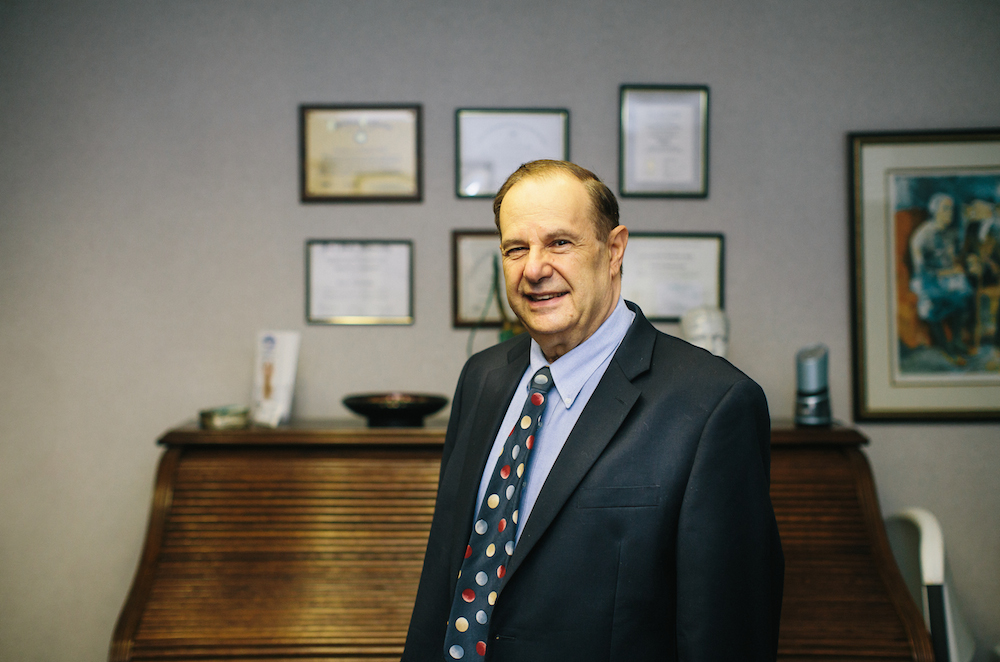Psychologist George Lindenfeld’s office at 138 Charlotte St. displays an eclectic mix of art nouveaux, art deco and arts and crafts. It’s telling that a box of facial tissue is always within reach. The Navy veteran says that he became curious about the workings of the mind as a child when his grandfather shut down and withdrew after being asked about his family — all lost under tragic circumstances.
Fast approaching his 75th birthday, Lindenfeld plans to retire this year, but not before he shares the results he has achieved helping veterans with post-traumatic stress disorder by using a relatively new and little-known device, the Bio Acoustical Utilization Device.
Every day, 22 American veterans of war commit suicide, says Ndidi Mojay, public affairs officer at the U.S. Department of Veterans Affairs in Washington. A key role in most of these suicides is PTSD, and Lindenfeld believes that the BAUD therapy method can help change those numbers. “This technology can heal PTSD,” he says. In the hands of a competent therapist, Lindenfeld explains, the device can identify a specific auditory frequency related to traumatic memories and disrupt the neural connection to the parts of the brain that trigger symptoms of anxiety.
“You don’t forget what happened, because it doesn’t take the memory away, but it quiets the mind,” Lindenfeld says. “My colleagues and I are using this with amazing results. The unfortunate point is there seem to be very few ways for a private practitioner such as myself to get word out of this quantum leap that can reset the brain to a pre-trauma state.” That may change, however, now that the offices of U.S. Sens. Bernie Sanders of Vermont and Richard Burr of North Carolina are presenting research from Lindenfeld and device inventor Frank Lawlis to the U.S. Senate Committee on Veterans’ Affairs.
The device has been registered by the Food and Drug Administration and is approved for use on humans as a Class II biofeedback device, meaning it has been determined to be as safe and easy to use as other Class II devices such as heating pads and hearing aids, Lawlis says. About 900 therapists in America and abroad are using it to treat individuals with attention deficit hyperactivity disorder, depression, anxiety, addictions and pain management.
Lawlis also says pharmaceuticals have been unsuccessful in many cases and have even made problems worse in others. “Psychotherapy has its limitations with recovery time, inconsistency, chronicity and its need for specialized professionals,” says Lawlis. “On the basis of neurological science, this device has enabled patients with PTSD to disrupt the destructive emotional components of trauma and assume more productive lives.”
For former Vietnam combat Army veteran Dr. Joseph Boscarino, one of the nation’s leading researchers in PTSD, the cause is personal. His identical twin brother died in January because of PTSD-related causes experienced since 1968. “This is a mission for me. I’ve been dealing with this for many years,” he says. Boscarino is planning to conduct formal research on the BAUD at Geisinger Center for Health Research in Danville, Pa.
Memories of combat trauma can stay with veterans for the rest of their lives. Ron Lapointe, a patient of Lindenfeld’s, says he was drafted and served in Vietnam during the height of the war with the 4th Infantry Division from August 1967 to August 1968. He returned with ongoing anger-management issues and came to Lindenfeld to see if it had to do with unresolved PTSD. His triggers were responses to auditory stimuli such as the sound of cars backfiring, fighter jets and helicopters. In his mind’s eye, he would see the faces of comrades who died in battle as well as recurring memories of life-threatening combat experiences.
“When I heard certain sounds, it used to trigger a dramatic reaction. After three sessions with Dr. Lindenfeld, I can hear gunfire, jets or a helicopter, and I do not have the same emotional response I had before treatment with the BAUD,” says Lapointe.
Richard Carland served with the U.S. Army in Iraq, where he was deployed in 2005 as a medic in a senior command position with the 172nd Stryker Brigade and participated in the initial surge of Bagdad. After returning to the U.S., he had severe panic attacks. “My heart would race. It felt like I would stop breathing any second and die of a heart attack,” he says. When he couldn’t relax or concentrate sufficiently to meet his academic goals, Carland realized he was suffering from PTSD.
“A good friend of mine had a family member who was a vet that committed suicide two days after being released from a hospital,” says Carland. “He had paranoia and would never go anywhere without some kind of weapon with him. I was never like that, but it made me realize how PTSD [manifests] in so many different ways.”
Carland was skeptical at first about Lindenfeld and the BAUD. “During the therapy he had me focus on those feelings that increased my heart rate and gave me cold sweats. After the treatment I couldn’t bring back those feelings again. Since then I kind of feel like a different person, like I got my ‘old self’ back,” he says.
Carland believes the Veteran Affairs system is overwhelmed, and he agreed to being interviewed by the Xpress to “reach out to those guys who don’t know what to do or where to go.” Lindenfeld contends that we need to expedite new technologies promising rapid healing to returning veterans who experienced trauma in service to our country. “They’ve earned it,” he says.



Yes, I have a question. Can they use this frequency with nano technology say in the ear canal?